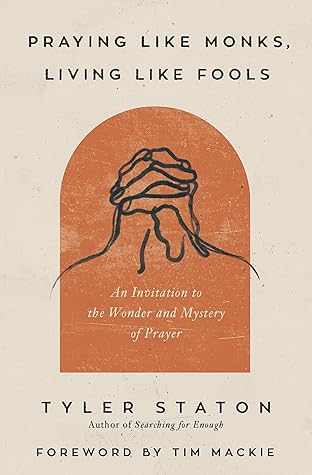More on this book
Community
Kindle Notes & Highlights
by
Tyler Staton
Started reading
July 13, 2024
prayer was just one way of describing the mystery and wonder of a human living in dynamic communion with God.
Prayer invites you to learn to listen to God before speaking, to ask like a child in your old age, to scream your questions in an angry tirade, to undress yourself in vulnerable confession, and to be loved—completely and totally loved, in spite of everything.
God is loving enough that a conversation starter is all he needs to draw someone all the way home.
There is a tragic disconnect between the sacred and the secular in today’s Christianity that has led to an unbiblical divorce between a “spiritual life” (made up of activities like Scripture reading, prayer, and—if you’re going for extra credit—tithing) and a “normal life” (made up of basically everything else).
Prayer is the intersection between an out-of-touch Western church and a spiritually curious Western world.
“If you remain in me and my words remain in you, ask whatever you wish, and it will be done for you.”2
Prayer itself makes us anxious because it uncovers fears we can ignore as long as we don’t engage deeply, thoughtfully, vulnerably with God. First, we must name the fears.
We Don’t Pray for Fear of Being Naive
Prayer can’t be mastered. Prayer always means submission. To pray is to willingly put ourselves in the unguarded, exposed position. There is no climb. There is no control. There is no mastery. There is only humility and hope.
To pray is to risk being naive, to risk believing, to risk playing the fool. To pray is to risk trusting someone who might let you down. To pray is to get our hopes up. And we’ve learned to avoid that. So we avoid prayer.
We Don’t Pray for Fear of Silence
“Silence is frightening because it strips us as nothing else does, throwing us upon the stark realities of our life,” writes Dallas Willard. “And in that quiet, what if there turns out to be very little to ‘just us and God’?”
We Don’t Pray for Fear of Selfish Motives
We Don’t Pray for Fear of Doing It Wrong
Pray Because You’re Overwhelmed
You and I have been groomed by a post-Enlightenment story of deconstruction that doesn’t trust God anymore but has plenty of reasons not to trust people either. The result is multiple generations of people who find safety in pretending they don’t need either one—I can trust myself, guide myself, be enough for myself.
We’ve avoided becoming naive, but we’ve done it at the cost of becoming overwhelmed.
Constantly overwhelmed lives should drive us to prayer at its purest and rawest, but the tendency for many of us is to pray safe, calculated prayers that insulate us from both disappointment and freedom.
Pray Because Trust Comes before Faith
Before we can have faith that God will answer a given request, we simply have to learn to trust the character of the God we’re talking to.
Trust allows us to say, “I don’t understand what God is doing right now, but I trust that God is good.”
Jesus hasn’t revealed a God we can perfectly understand, but he has revealed a God we can perfectly trust. Trust is the certainty that the listening God hears and cares. I trust the God who, even when he doesn’t make the suffering go away, wears the suffering alongside me. Trusting the God revealed in Jesus means silence is real, but it’s not forever.
Pray Because Complaints Are Welcome
God is looking for relationship, not well-prepared speeches spoken from perfect motives.
If the Bible tells us anything about how to pray, it says that God much prefers the rough draft full of rants and typos to the polished, edited version. C. S. Lewis said of prayer, “We must lay before Him what is in us, not what ought to be in us.”14
Pray Because the Only Way to Get It Wrong Is by Trying to Get It Right
Prayer isn’t a noble monologue; it’s a free-flowing conversation, and the only way to get prayer wrong is to try to get it right.
Philippians 4:5–7
The deep fear that robs our prayers of power is the lie that the Lord isn’t near.


